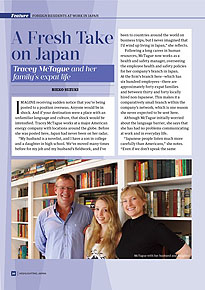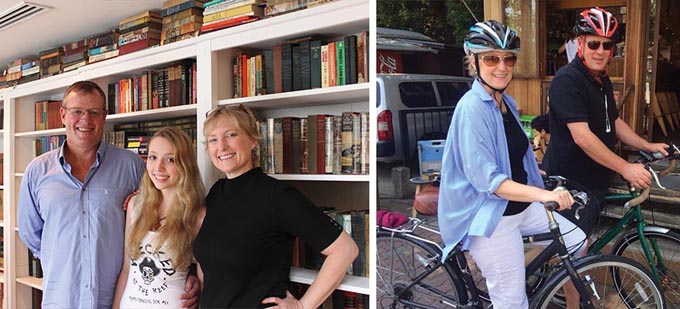Home > Highlighting JAPAN >Highlighting Japan October 2014>Foreign residents at work in Japan
Highlighting JAPAN

Foreign residents at work in Japan
A Fresh Take on Japan
Tracey McTague and her family’s expat life

Imagine receiving sudden notice that you’re being posted to a position overseas. Anyone would be in shock. And if your destination were a place with an unfamiliar language and culture, that shock would be intensified. Tracey McTague works at a major American energy company with locations around the globe. Before she was posted here, Japan had never been on her radar.
“My husband is a novelist, and I have a son in college and a daughter in high school. We’ve moved many times before for my job and my husband’s fieldwork, and I’ve been to countries around the world on business trips, but I never imagined that I’d wind up living in Japan,” she reflects.
Following a long career in human resources, McTague now works as a health and safety manager, overseeing the employee health and safety policies for her company’s branch in Japan. At the firm’s branch here—which has six hundred employees—there are approximately forty expat families and between thirty and forty locally hired non-Japanese. This makes it a comparatively small branch within the company’s network, which is one reason she never expected to be sent here.
Although McTague initially worried about the language barrier, she says that she has had no problems communicating at work and in everyday life.
“Japanese people listen much more carefully than Americans,” she notes. “Even if we don’t speak the same language, there’s a culture of listening intently and trying to understand. This has been a huge help to us. One episode in particular left a very strong impression on me. On my first day at the office, the employees were assembled for my introduction. As more people entered, the room began to fill up. Someone addressed everybody in the room, and they all grabbed their chairs, took three steps forward, and sat down again. As a result, the back of the room opened up, and everybody was able to enter. Since the request was made in Japanese, I don’t know what was said. But if this were America, I’m sure that plenty of people would have just ignored the request, and it would have been unimaginable for everyone to move in unison without practicing. I was truly amazed.”
The family chose their home keeping in mind that the place had to be near the international school their daughter attends and be big enough to keep their large dogs. The result is that McTague has a ninety-minute commute each way.
“Not only do I need to work closely with the American and European branches of the company—meaning I have to work around their time zones—but my total commute is three hours,” she says. “To be honest, it’s tough. My job is to ensure the health and safety of our employees, but I also have to pay attention to my own health, as well as making sure my teammates at the Japanese branch don’t overwork, which is the tendency here.”
On weekends, the McTague family likes to go out for strolls with their dogs or go cycling together. They say one of their big discoveries was finding that Tokyo has lots of greenery and places to relax.
“Even now I’m overwhelmed by the complicated layout of Shinjuku Station and the enormous number of people,” she remarks. “But before coming here, I thought all of Tokyo was like Shinjuku Station. If you travel just a short distance away from the city center, though, there are very quiet residential areas. “As my husband says, ‘Just walking around, lots of ideas for new novels pop into my head.’ Even though Tokyo is a major metropolis, you can walk down a backstreet and find yourself somewhere totally different. It’s a constant series of new discoveries.”
Japan’s education and sanitation standards are high, she adds, and the country is comfortable and safe. “As an expat, I may be asked to move again in a few years or even months,” McTague says. “Until that time, I want to enjoy my new life in Japan to the fullest, and I want my family to learn and have as many new experiences as possible.” The McTagues seem to be doing exactly that in a country that is proving to be even more comfortable than they expected.
© 2009 Cabinet Office, Government of Japan






